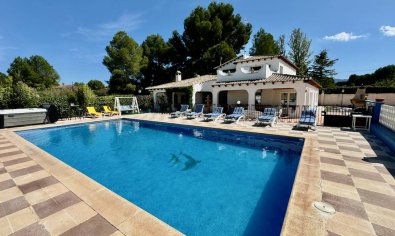News from Spain: What happened in the past week?

Ghost homes in Spain get a new lease on life through renovation projects
After the 2008 real estate crisis, Spain was left with countless unfinished or abandoned homes. These "ghost homes" were an eyesore in cities and towns for years. Now, companies are seizing the opportunity to breathe new life into these properties through renovations.
One example is Carmon, an investment group led by Tony Sotelo. They focus on refurbishing homes in regions such as Madrid, Castilla-La Mancha, and Valencia. According to Sotelo, these fully renovated homes are sold at prices comparable to existing properties but with a modern look and upgraded features.
In Escalona (Toledo), an abandoned housing development has undergone a complete transformation. The homes now feature new installations and modern technology, such as voice-controlled shutters, smart lighting, cameras, and alarm systems. A communal swimming pool is also being built to enhance residents' quality of life.
This trend is also visible in the Costa Cálida and Costa Blanca regions, where multiple similar projects are underway. In addition to reducing housing vacancies, these renovations provide affordable and modern living options. With an estimated monthly mortgage of around €700, these homes can sometimes be cheaper than renting in the same area.
This initiative aligns with the concept of a circular economy, where existing resources are reused and improved. It contributes to the revitalization of underdeveloped areas and offers new opportunities for both buyers and the local community.
Answering the phone with a simple "sí" can be dangerous in Spain
In Spain, it is common to answer a phone call with a simple "sí" (yes). However, this can pose a risk, as criminals may record the response and use it to commit fraud or steal identities. But how does this scam work, and how can you protect yourself?
Spaniards often answer the phone with expressions like "diga" (speak), "¿quién es?" (who is it?), or just "sí." However, the latter can be risky when dealing with scammers. There are two common types of fraud:
-
The fake order scam
The victim answers with "sí," after which a recorded message plays, stating that a service has been subscribed to for a certain amount. In a panic, the person calls back, and a supposed "customer service agent" offers to cancel the service—when in reality, they are trying to steal bank details or personal information. -
Identity theft
The scammer poses as a representative of a utility company, bank, or insurance provider and asks a series of questions. As soon as the victim responds "sí" to anything, the recording is later used as "proof" of consent for an unwanted service or purchase.
How to avoid this scam?
-
Don't answer the phone with "sí"; instead, use "diga" or "¿quién es?".
-
Never call back an unknown number without verifying it first.
-
Hang up immediately if the caller does not identify themselves or mentions a service you have not signed up for.
What to do if you become a victim?
-
Regularly check your bank statements for suspicious transactions.
-
Search online for information about the number that called you.
-
Change passwords for any potentially compromised accounts.
-
Perform an "egosurfing" check—search your name online to see if any unwanted accounts or profiles have been created in your name.
Five Spanish airports rank among the best in the world
Spanish airports have scored highly in international traveler reviews. According to a recent study by DiscoverCars.com, based on the experiences of 3,500 tourists, five Spanish airports are among the best-rated in the world.
Lanzarote Airport (ACE) received the highest rating in Spain, ranking fourth globally with a score of 8.91 out of 10. Travelers particularly praised the fast passport control process.
In fifth place is Fuerteventura Airport (FUE) with a score of 8.89, where passengers highlighted the efficient handling of travelers. Gran Canaria's Las Palmas Airport (LPA) also performed well, securing the seventh spot with a rating of 8.69.
Tenerife South Airport (TFS) ranked fifteenth with a score of 8.28, while Alicante Airport (ALC) took eleventh place with a score of 8.34.
These high ratings underline the excellent quality and efficiency of Spanish airports, especially in the Canary Islands. This contributes to an enjoyable travel experience and strengthens Spain's reputation as a well-organized and welcoming tourist destination.
Spain’s coastline goes upscale: wave of luxury hotels replaces budget options
A striking transformation is taking place along Spain’s coastline. Budget hotels are increasingly being replaced by luxury four- and five-star establishments. This shift is a strategic move by the tourism industry to attract a wealthier clientele while boosting revenue.
According to an analysis by Exceltur, nearly 60,000 additional luxury hotel beds have been added across 728 coastal towns between 2019 and 2024. This change has not come from building new hotels but from upgrading existing accommodations. Hundreds of older one- to three-star hotels, guesthouses, and hostels have been converted into high-end establishments.
Regions such as the Costa Blanca, Ibiza, Costa del Sol, and Mallorca are investing heavily in luxury accommodations. The Costa Blanca has seen a more than one-third increase in luxury beds, while Ibiza and the Costa del Sol have grown by almost a fifth, and Mallorca has experienced a slightly smaller rise. The Costa Cálida, Costa de Almería, and Costa de la Luz have seen fewer changes.
The financial impact of this shift is significant. In the past five years, tourist destination revenue has increased by over a third, driven by rising room prices while occupancy rates have remained stable. This indicates that tourists are willing to pay more for a better experience.
Ibiza tops the list with an average room price of nearly €153 per night—almost 50% higher than in 2019. Barcelona and Tenerife also perform well, with respective rates of €138 and €121 per night.
The move toward luxury hotels has also had a positive impact on employment. Since 2019, the number of jobs in the hotel sector has risen significantly, as four- and five-star hotels require much more staff than budget hotels. Additionally, job quality has improved: temporary contracts have dropped from a third to less than 10%, while permanent contracts have increased by nearly 60,000.
This strategy has proven not only profitable for the hotel industry but also beneficial on a broader social level. The combination of higher service quality, fewer temporary contracts, and more stable employment makes the transition to luxury accommodations a sustainable and successful formula for the future of Spanish tourism.















